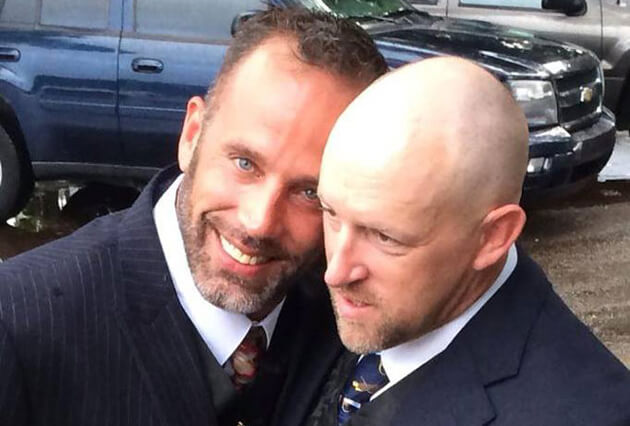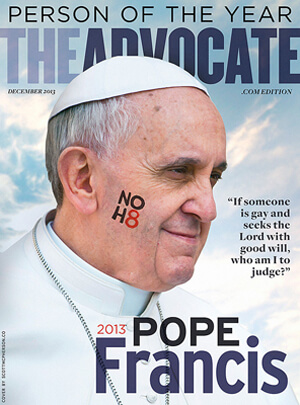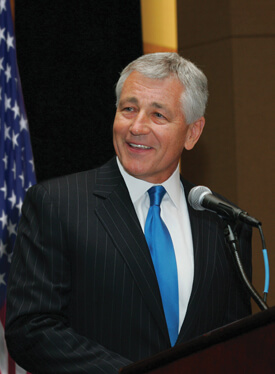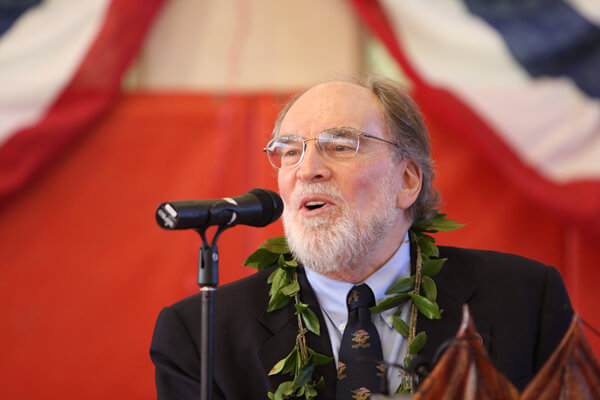Seventh Circuit Judge Richard Posner took a very tough approach to arguments by the states of Indiana and Wisconsin in defense of their same-sex marriage bans.
BY ARTHUR S. LEONARD | Just two weeks after coming down hard on attorneys for the States of Wisconsin and Indiana in a heated oral argument, a three-judge panel of the Chicago-based Seventh Circuit Court of Appeals issued a unanimous decision on September 4 striking down their bans on same-sex marriage.
Writing for the panel, Circuit Judge Richard Posner, one of Ronald Reagan’s earliest judicial appointees in 1981, decisively rejected all the states’ arguments in support of their anti-marriage laws, stating that “the grounds advanced by Indiana and Wisconsin for their discriminatory policies are not only conjectural; they are totally implausible.”
Throughout, Posner’s language was direct, dismissive, and even derisive in rejecting the defense mounted by Indiana and Wisconsin. His 40-page opinion was telegraphed by his questioning during the oral argument; the issues he raised and pressed repeatedly dominate his written analysis.
His first questions to the attorney for Indiana concerned the welfare of children — those being raised by same-sex couples there. And his opinion starts in much the same way: “Formally these cases are about discrimination against the small homosexual minority in the United States. But at a deeper level, as we shall see, they are about the welfare of American children. The argument that the states press hardest in defense of their prohibition of same-sex marriage is that the only reason government encourages marriage is to induce heterosexuals to marry so that there will be fewer ‘accidental births,’ which when they occur outside of marriage often lead to abandonment of the child to the mother (unaided by the father) or to foster care. Overlooked by this argument is that many of those abandoned children are adopted by homosexual couples, and those children would be better off both emotionally and economically if their adoptive parents were married.”
During the oral argument, all three judges on the panel, also including Obama appointee David Hamilton and Clinton appointee Ann Claire Williams, were skeptical about treating this as a “fundamental right to marry” case –– expressing concern about how such a right could be characterized and delineated so as not to open up arguments about a constitutional right to polygamy or incest.
Unlike the majorities in the Fourth and 10th Circuits, who based their rulings on the fundamental rights theory, the Seventh Circuit panel preferred to take the equal protection route. And their opinion on that ground was significant in two respects.
First, the court concluded that Indiana and Wisconsin could not even meet the most deferential standard of judicial review –– that their marriage bans had some rational basis.
But the panel also concluded –– as did the San Francisco-based Ninth Circuit earlier this year –– that claims of sexual orientation discrimination merit heightened scrutiny by the court, under which the government must show not merely a rational basis for a policy but that it significantly advances an important government policy.
Posner’s opinion also happens to be fun to read, with his plain-speaking, cut-through-the-cant style of dealing with ridiculous arguments. He does not politely abstain from commenting; he cuts to the chase and calls ‘em as he sees ‘em.
Some of the highlights of his style:
“Our pair of cases is rich in detail but ultimately straight-forward to decide. The challenged laws discriminate against a minority defined by an immutable characteristic, and the only rationale that the states put forth with any conviction — that same-sex couples and their children don’t need marriage because same-sex couples can’t produce children, intended or unintended — is so full of holes that it cannot be taken seriously.”
“Because homosexuality is not a voluntary condition and homosexuals are among the most stigmatized, misunderstood, and discriminated-against minorities in the history of the world, the disparagement of their sexual orientation, implicit in the denial of marriage rights to same-sex couples, is a source of continuing pain to the homosexual community.”
And then, noting that other recent gay rights decisions –– including the 2003 Lawrence v. Texas sodomy ruling and last year’s Defense of Marriage Act ruling –– rendered moot a 1972 Supreme Court precedent that found “no substantial federal question” in a marriage equality case, Posner said the recent cases are distinguishable from the one before the panel. Then, he added, “At least we think they’re distinguishable. But Justice Scalia, in a dissenting opinion in Lawrence, joined by Chief Justice Rehnquist and Justice Thomas, thought not. He wrote that ‘principle and logic’ would require the Court, given its decision in Lawrence, to hold that there is a constitutional right to same-sex marriage.”
There’s nothing quite like enlisting Antonin Scalia on your side in a gay rights decision…
The panel’s opinion relied on sarcasm, as well, in demolishing Indiana’s argument that marriage was intended to channel heterosexual procreation into responsible family arrangements: “Indiana’s government thinks that straight couples tend to be sexually irresponsible, producing unwanted children by the carload, and so must be pressured (in the form of governmental encouragement of marriage through a combinations of sticks and carrots) to marry, but that gay couples, unable as they are to produced children unwanted or wanted, are model parents — model citizens really — so have no need for marriage. Heterosexuals get drunk and pregnant, producing unwanted children; their reward is to be allowed to marry. Homosexual couples do not produce unwanted children; their reward is to be denied the right to marry. Go figure.”
Posner also points out that if Indiana and Wisconsin are trying to reduce out-of-wedlock births by denying marriage to same-sex couples, their strategy is not working, citing statistics showing the rate of such births went up in each state after they adopted explicit bans on same-sex marriage. Gay couples are more likely to adopt children than straight couples, he notes, and many of those children will be the out-of-wedlock children surrendered for adoption by single mothers.
“If the fact that a child’s parents are married enhances the child’s prospects for a happy and successful life, as Indiana believes not without reason,” he wrote, “this should be true whether the child’s parents are natural or adoptive. The state’s lawyers tell us that ‘the point of marriage’s associated benefits and protections is to encourage child-rearing environments where parents care for their biological children in tandem.’ Why the qualifier ‘biological’? The state recognizes that family is about raising children and not just about producing them.”
Posner discussed the emotional comfort provided to the children of married same-sex parents, writing, “Suppose such a child comes home from school one day and reports to his parents that all his classmates have a mom and a dad, while he has two moms (or two dads, as the case may be). Children, being natural conformists, tend to be upset upon discovering that they’re not in step with their peers. If a child’s same-sex parents are married, however, the parents can tell the child truthfully that an adult is permitted to marry a person of the opposite sex, or if the adult prefers as some do a person of his or her own sex, but that either way the parents are married and therefore the child can feel secure in being the child of a married couple. Conversely, imagine the parents having to tell their child that same-sex couples can’t marry, and so the child is not the child of a married couple, unlike his classmates.”
Posner also took direct aim at the argument from Wisconsin that “tradition” justifies the marriage ban there: “Tradition per se has no positive or negative significance. There are good traditions, bad traditions pilloried in such famous literary stories as Franz Kafka’s ‘In the Penal Colony’ and Shirley Jackson’s ‘The Lottery,’ bad traditions that are historical realities such as cannibalism, foot-binding, and suttee, and traditions that from a public-policy standpoint are neither good nor bad (such as trick-or-treating on Halloween). Tradition per se therefore cannot be a lawful ground for discrimination — regardless of the age of the tradition.”
Quoting the same words from Oliver Wendell Holmes that the late Justice Harry Blackmun cited in his dissent from the infamous 1986 Supreme Court ruling upholding Georgia’s sodomy law, Posner wrote, “Holmes thought it ‘revolting to have no better reason for a rule of law than that so it was laid down in the time of Henry IV.” Posner helpfully added that the Henry died in 1413. Highlighting the age of the tradition underlying bans on same-sex marriage, the judge quoted Leviticus 18:22, and concluded, “If no social benefit is conferred by a tradition and it is written into law and it discriminates against a number of people and does them harm beyond just offending them, it is not just a harmless anachronism; it is a violation of the equal protection clause.”
Posner found that Wisconsin provided no evidence to support its claim that “thousands of years of collective experience” prove different-sex marriage is “optimal for the family, society, and civilization.”
And even it the state’s assertion were true, he wrote, “How does that bear on same-sex marriage? Does Wisconsin want to push homosexuals to marry persons of the opposite sex because opposite-sex marriage is ‘optimal?’ Does it think that allowing same-sex marriage will cause heterosexuals to convert to homosexuality? Efforts to convert homosexuals to heterosexuality have been a bust; is the opposite conversion more feasible?”
Posner pointed out that the states had provided no evidence that “any heterosexuals have been harmed by same-sex marriage,” and observed that even though some people might be “distressed by the idea or reality of such marriage,” this could not count as a harm justifying the ban.
Dismissing the arguments from both states that marriage amendments adopted by popular vote have a certain sanctity, Posner wrote, “Minorities trampled on by the democratic process have recourse to the courts; the recourse is called constitutional law.”
Posner could have stopped there, having found no rational basis for the marriage bans. Instead, he took on the question of whether the plaintiffs’ claims merited heightened scrutiny, which would have created an even higher hurdle for the states in defending their policies.
Here, in examining whether sexual orientation is a “suspect classification” eligible for heightened scrutiny in reviewing discrimination claims, he rejected the states’ arguments that gay people are a politically powerful group that needs no help from the courts, the adoption of the marriage amendments debunking that assertion. Posner also emphasized the history of anti-gay discrimination –– which he characterized during oral argument as “savage” –– the extensive scientific literature establishing homosexuality’s immutable nature, and the irrelevance of one’s sexual orientation in their ability to contribute to society. The determination that heightened scrutiny in warranted in sexual orientation discrimination cases will prove useful in future Seventh Circuit litigation.
With this opinion, three federal courts of appeals have ruled in favor of marriage equality, and it is widely predicted that the Ninth Circuit, also relying on heightened scrutiny, will add to that number after hearing arguments in cases from several states on September 8. Less certain is the outcome in the Cincinnati-based Sixth Circuit, which heard arguments in cases from four states weeks before the Seventh Circuit but has yet to issue its opinion. Appeals are now pending in the Fifth Circuit, where Texas has appealed a pro-marriage equality ruling and plaintiffs are about to appeal an absurdly reasoned federal anti-marriage ruling from Louisiana. On the same day the Seventh Circuit ruled, Florida Attorney General Pam Bondi announced she had filed a notice of appeal with the 11th Circuit from a recent federal court marriage equality ruling in that state.
With the appellate court count three for three, there is a possibility of achieving marriage equality nationwide without Supreme Court intervention should that court let petitions for appeal of favorable circuit court rulings pile up and then –– if the board were swept clean –– deny them all in one fell swoop. One dissenting circuit, however, would essentially guarantee Supreme Court review.
Attorneys from Lambda Legal and the ACLU LGBT Rights Project and the Indiana ACLU chapter argued the case for plaintiffs before the Seventh Circuit, while the states were represented by the Indiana solicitor general and a Wisconsin assistant attorney general.
It seems likely that the Republican governors of both states will petition the Supreme Court for review, though Wisconsin’s Scott Walker has been less outspoken than Indiana’s Mike Pence in opposition to same-sex marriage. Could either of them be persuaded to follow the example of Pennsylvania’s conservative Republican governor, Tom Corbett, who, after losing at the district court level, decided to abandon any plan for appeal?




































